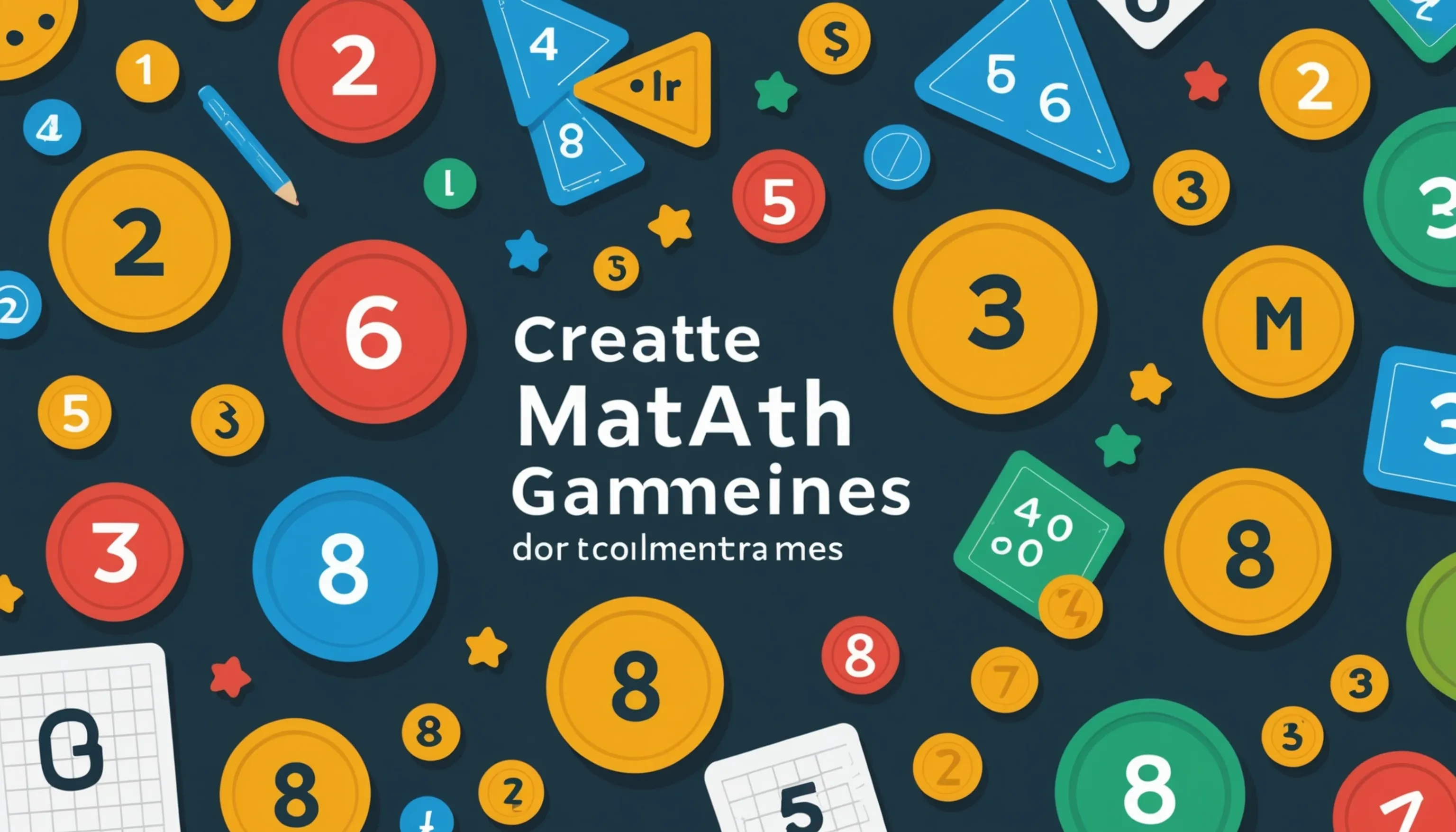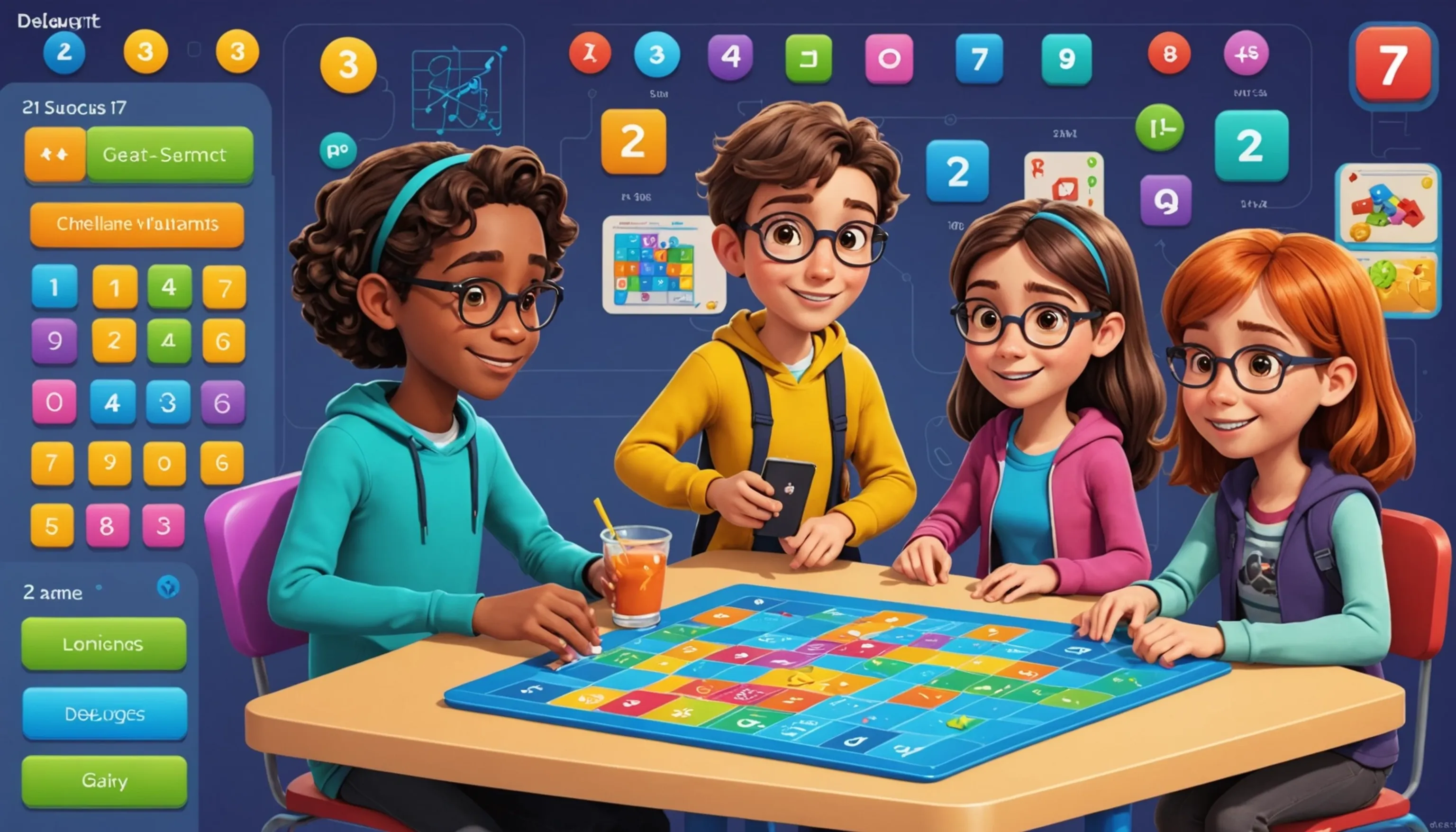Free Math Games Online for Teenagers
 HvWHenry van Wagenberg
HvWHenry van Wagenberg
Top Free Math Games Online for Teenagers
Finding engaging free math games online for teenagers can make learning math fun and interactive. These games cover a variety of math topics, from basic arithmetic to advanced algebra and geometry. Popular platforms like Khan Academy and Prodigy Math offer games designed to challenge and motivate students.
These games not only help reinforce math concepts but also encourage critical thinking and problem-solving skills. With interactive elements and game-based learning, teenagers can enjoy practicing math in a way that feels less like traditional studying and more like play.
Benefits of Math Games for Teenagers
Math games offer numerous benefits for teenagers, transforming the often daunting subject of math into an engaging and enjoyable experience. Here are some key advantages:
- Improved Engagement: Math games capture teenagers' attention through interactive content, making learning feel less like a chore and more like a fun challenge.
- Enhanced Problem-Solving Skills: Many math games require critical thinking and strategy, helping teenagers develop their problem-solving abilities that are essential for future academic and life challenges.
- Instant Feedback: Online math games provide immediate feedback on performance, allowing students to learn from their mistakes in real-time. This promotes a growth mindset and encourages persistence.
- Personalized Learning: Many platforms adapt to individual skill levels, offering tailored challenges that match a teenager's pace and ability. This customization helps ensure that students remain challenged without becoming overwhelmed.
- Social Interaction: Multiplayer math games enable teenagers to collaborate with peers, fostering teamwork and communication skills. This social aspect can motivate students to engage more actively with math.
Incorporating math games into daily routines not only strengthens foundational math skills but also builds confidence. As teenagers experience success in these games, they are likely to approach math with a more positive attitude, ultimately leading to improved academic performance.
How Math Games Enhance Learning
Math games are powerful educational tools that significantly enhance learning for teenagers. These interactive platforms not only make math enjoyable but also facilitate deeper understanding and retention of mathematical concepts.
Firstly, math games often incorporate elements of gamification, which motivates students to engage with the material. By introducing challenges, rewards, and levels, these games transform learning into an exciting adventure. This approach keeps teenagers invested in their progress and encourages them to tackle even the most complex topics.
Secondly, math games promote active learning. Unlike traditional rote memorization methods, these games require students to apply their knowledge in real-time. They must think critically and strategize to solve problems, reinforcing their understanding of concepts like addition, subtraction, fractions, and algebra.
Moreover, many math games offer adaptive learning experiences, adjusting difficulty levels based on the player’s performance. This personalization ensures that students are consistently challenged at an appropriate level, enhancing their problem-solving skills without causing frustration.
Lastly, the social aspect of multiplayer math games fosters collaboration and communication among peers. Teenagers can work together to solve problems, share strategies, and learn from one another, creating a supportive learning environment. This collaborative approach not only strengthens math skills but also builds essential soft skills that are valuable in all areas of life.

Popular Free Math Games for Different Skills
There are several popular free math games available online that cater to different skills and learning levels. For basic arithmetic, Math Playground offers engaging puzzles and games that reinforce addition, subtraction, multiplication, and division. Khan Academy provides a range of challenges across various math topics, from fractions to algebra.
For those looking for adventure-based learning, Prodigy Math combines math practice with an exciting game format, enabling students to explore a fantasy world while solving math problems. These games not only enhance skills but also make math enjoyable for teenagers.
Khan Academy: Engaging Math Challenges
Khan Academy is renowned for its comprehensive educational resources, and its math section is a standout feature that offers engaging challenges for teenagers. This platform provides a personalized learning experience, allowing students to progress at their own pace while mastering various math concepts.
One of the primary benefits of Khan Academy is its extensive library of math challenges that cover a wide range of topics, from basic arithmetic to advanced calculus. Each challenge is designed to reinforce understanding and build confidence. For instance, as students work through problems, they receive instant feedback, which helps them identify areas for improvement.
Khan Academy incorporates interactive elements that make learning math fun. Gamified features, such as earning badges and points for completing tasks, motivate students to tackle more challenges and stay engaged. This sense of achievement encourages them to continue progressing through the curriculum.
Additionally, the platform offers instructional videos that provide clear explanations of complex topics. These videos are particularly helpful for visual learners, as they break down challenging concepts into manageable steps. Students can revisit these resources whenever needed, ensuring a thorough understanding before moving on to more advanced material.
Overall, Khan Academy’s engaging math challenges not only enhance learning but also foster a positive attitude toward math, making it an invaluable resource for teenagers looking to improve their skills.
Prodigy Math: Adventure-Based Learning
Prodigy Math stands out as an innovative platform that combines math learning with adventure-based gameplay, making it an engaging option for teenagers. This online game immerses students in a fantasy world where they embark on quests and challenges that require them to solve math problems in order to progress.
One of the key features of Prodigy Math is its ability to adapt to each student’s skill level. As teenagers play, the game assesses their performance and tailors questions to match their abilities. This personalized approach ensures that learners are consistently challenged without feeling overwhelmed, allowing them to build confidence in their math skills.
As students navigate through the Prodigy world, they encounter various characters and obstacles that require them to apply their math knowledge in real-time. For example, they might need to answer questions related to multiplication, division, fractions, or even geometry to defeat monsters or unlock new areas. This adventure-based learning not only makes math practice fun but also reinforces problem-solving skills.
Moreover, Prodigy Math includes a comprehensive reporting system that allows parents and teachers to track progress and achievements. This feature enables them to see which areas students excel in and where they might need additional support. The combination of gaming and education makes Prodigy Math a valuable tool for promoting math skills in an enjoyable way.

Math Playground: Fun and Interactive Puzzles
Math Playground is an exceptional online resource that offers a wide variety of fun and interactive puzzles designed to make math enjoyable for teenagers. This platform features engaging games that cover essential math concepts, providing a playful approach to learning.
One of the standout features of Math Playground is its diverse selection of games, ranging from basic arithmetic puzzles to more complex problem-solving challenges. Students can explore topics like fractions, geometry, and algebra while enjoying a gaming experience. For instance, games like Math Jeopardy and Math Lines encourage critical thinking and reinforce skills through competitive play.
The interactive nature of Math Playground promotes active learning. By solving puzzles and completing challenges, teenagers can develop their math skills in a dynamic environment. Each game is designed to provide instant feedback, allowing players to learn from their mistakes and improve their understanding of various concepts.
Additionally, Math Playground incorporates visually appealing graphics and animations that capture students' attention and keep them engaged. The platform also offers a variety of difficulty levels, catering to different skill sets. This adaptability ensures that all students, regardless of their proficiency, can find suitable challenges.
Overall, Math Playground effectively combines entertainment with education, making math practice enjoyable and accessible. It is a fantastic tool for parents and teachers looking to enhance teenagers' math skills through interactive learning experiences.
How to Incorporate Math Games into Study Routines
Incorporating math games into study routines can enhance learning while keeping teenagers engaged. Here are some effective strategies:
- Set Specific Goals: Determine what math skills to improve and select games that target those areas. This helps focus the practice.
- Schedule Game Time: Allocate specific times during the week dedicated to playing math games. This ensures consistency and makes it a regular part of the study routine.
- Mix It Up: Use a variety of games to cover different topics and keep the experience fresh. Combining adventure-based games with puzzles can cater to various learning styles.
- Encourage Collaboration: Invite friends or siblings to play together, fostering a social learning environment. This can motivate teenagers and make math practice more enjoyable.
By integrating math games into study routines, learning becomes fun and effective.
Setting Up a Fun Learning Environment
Creating a fun learning environment for math games is essential to keep teenagers engaged and motivated. Here are several strategies to enhance their learning experience:
1. Designate a Dedicated Space: Set up a specific area in your home or classroom that is comfortable and free from distractions. This space should be equipped with necessary supplies like a computer, tablet, or board games.
2. Use Bright and Inviting Decor: Incorporate colorful posters, charts, and educational materials related to math concepts. A visually stimulating environment can inspire creativity and interest in learning.
3. Incorporate Technology: Use devices that can host math games, ensuring that teenagers have easy access to various online platforms. Tablets and laptops can also facilitate interactive lessons and collaborative gameplay.
4. Foster a Positive Atmosphere: Encourage a growth mindset by celebrating successes and reinforcing the idea that mistakes are part of the learning process. This can help reduce anxiety and promote a willingness to tackle challenging concepts.
5. Schedule Regular Game Days: Set aside specific days for math game sessions, making it a fun weekly tradition. This will help students look forward to their learning time and make math feel less like a chore.
By implementing these strategies, you can create an engaging and fun learning environment that enhances the effectiveness of math games.
Scheduling Game Time Effectively
Scheduling game time effectively is crucial for maximizing the benefits of math games in a teenager's study routine. Here are some practical tips to ensure that game time is both productive and enjoyable:
1. Create a Weekly Schedule: Design a weekly timetable that includes dedicated slots for math game sessions. Consistency is key, so try to stick to the same days and times each week. This will help teenagers develop a routine and make learning more predictable.
2. Balance Game Time with Study Sessions: Ensure that game time complements traditional study methods. For example, consider alternating between 30 minutes of focused study on math concepts and 15 minutes of engaging with math games. This balance helps reinforce learning while keeping it fun.
3. Utilize Breaks Wisely: Incorporate short math game sessions during breaks from homework or other study activities. These breaks can serve as mental refreshers, allowing teenagers to return to their studies with renewed focus.
4. Involve Friends or Family: Schedule group game times with friends or family members. This social aspect not only makes learning more enjoyable but also encourages friendly competition, motivating teenagers to improve their skills.
5. Monitor Progress: Regularly assess how effective the game time is. If certain games are particularly beneficial, consider allocating more time to those. Adapt the schedule as needed to ensure that game time remains a valuable part of the learning experience.
Tracking Progress and Achievements
Tracking progress and achievements in math games is essential for helping teenagers understand their learning journey and stay motivated. Here are several effective strategies to monitor their development:
1. Use Built-in Analytics: Many online math games, like Khan Academy and Prodigy Math, offer built-in analytics that track performance over time. Encourage teenagers to regularly check their progress reports, which provide insights into areas they excel in and those that need improvement.
2. Set Specific Goals: Work with teenagers to establish clear, achievable goals related to their math skills. These could include completing a certain number of levels in a game or mastering specific concepts. Having measurable goals gives a sense of direction and purpose.
3. Maintain a Progress Journal: Encourage students to keep a journal where they can document their experiences with math games. They can note down the games played, skills improved, and any challenges faced. Reflecting on their journey can enhance self-awareness and motivation.
4. Celebrate Achievements: Recognize and celebrate milestones, whether it's completing a challenging level or mastering a new concept. This could involve simple rewards or verbal praise, which reinforces positive behavior and encourages continued effort.
5. Review and Adjust: Regularly review the tracking methods and progress with teenagers. Discuss what strategies are working and what needs adjustment. This open dialogue fosters a supportive learning environment and encourages students to take ownership of their educational journey.
